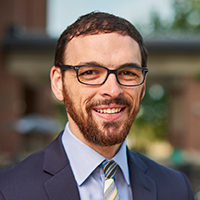
Christopher Jackson
“For us, and especially for me, it’s what can we do to deal with this crisis and save the most lives? That’s what matters.”
Christopher Jackson, ’13, had long anticipated his entrance into public service. Having studied political science and pursued public office prior to law school, his ambition beyond MSU Law was not litigation or to represent clients, but rather to serve communities.
In October 2019, Jackson started as a State Assistant Administrator within the Policy and Planning Administration of the Department of Health and Human Services for the State of Michigan, and after just a few months in this new position, Jackson was met with an unexpected challenge: COVID-19.
While confident in the role, having previous experience with health and human services work as an attorney at Elder Law of Michigan for nearly four years, Jackson was thrust into the work with the arrival of Michigan’s first COVID-19 cases in early March 2020 and the demanding pace would only speed up.
At the time of the virus’s onset in Michigan, Jackson’s team had already started preparation, anticipating its arrival in the state given its increasingly rapid spread across the world. Knowing the amount of questions soon to arise from communities all over the state, Jackson and his team had begun assisting with the state’s hotline and call center for people seeking guidance to navigate the crisis.
But then it happened. When COVID-19 cases started to spike in Michigan, it wasn’t long before – like so many other working Michiganders – Jackson, his team, and their counterparts were ordered to work from home. With the hotline still in the training stage and the new inability to move forward with an in-person call center, Jackson and his team went to work not only expanding the bandwidth of the technology to efficiently manage call volume, but also gathering hundreds of more volunteers and readying them to take calls from home.
“Within the next week, we had moved our entire hotline from being in person with up to 14 people to a completely remote structure with a volunteer list of 700 people,” he explained. “In a matter of less than two weeks, we took the bull by the horns and completely rebuilt it.”
In the days leading up to its official launch, the hotline received 70,000 calls. As the call center fielded questions about testing locations, executive orders, and more, Jackson and his team continued working to ensure that everything went as smoothly as possible.
From assisting in setting up the field hospitals and finding the medical personnel who would operate each site to writing policy manuals for these remote locations to meeting with various administrations in order to address arising concerns, Jackson and his colleagues had their hands full as professionals tasked with supporting the state through the pandemic while they, too, tried to personally navigate all of the changes.
“For us, and especially for me, it’s what can we do to deal with this crisis and save the most lives? That’s what matters,” he said. “For most of my team, myself included, we didn’t have a single day off, even weekends. I think my first day off was May 20-something. We were working anywhere from 12 to 20-hour days, and I know some of our teams are still working those hours.”
As the numbers continue to rise and fall all over the world, Michigan has been praised for its response to the initial outbreak. A report from the Imperial College COVID-19 Response Team highlighted Michigan as one of the top states for bending the curve and keeping it low.
“We’re really proud of our team for what we’ve been able to accomplish and do,” Jackson said. “We mothballed the field hospitals because the need for surge capacity wasn’t there because we were able to successfully bend the curve as a state. We’ve moved onto even more COVID projects.”
Jackson said the high priorities for his administration moving forward are assisting with contact tracing, establishing quarantine and isolation supports, and determining how to most effectively continue communicating testing site locations and other important testing information with the people of Michigan. He explained that additional work is being devoted to supporting minority and low-income communities through this time, including the establishment of a special task force to address the needs of the people in those communities by Governor Gretchen Whitmer, ’98.
“A lot of the communities that are hardest hit are minority communities and/or low-income communities and that makes it even worse of a public health crisis for a variety of reasons, especially in the United States where health insurance is driven by employment. But also many of those communities have a significant distrust of the government or institutions, and health care institutions as a whole,” he explained. “Widespread discrimination over decades causes folks to not seek those services.”
Jackson sees the potential opportunity for great change and progress during this challenging period, and he’s eager to be on the policy side advocating for the changes that need to happen.
“Being able to say in 50 years that we were a part of that policy process and the ability to make a tangible impact during something that’s foundationally going to be in the history books much like the influenza outbreak in 1918; something we’ll continue to talk about for a century and how it revolutionized policy, health, government, and society; being able to be just a small component of that, it’s a really mighty thing.”

